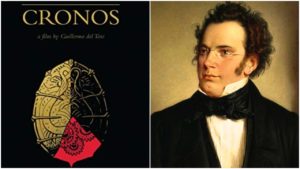
Opera Meets Film: How Schubert’s ‘Die Schöne Müllerin’ Tells The Story of Guillermo del Toro’s ‘Cronos’
By David Salazar“Opera Meets Film” is a feature dedicated to exploring the way that opera has been employed in cinema. We will select a section or a film in its entirety, highlighting the impact that utilizing the operatic form or sections from an opera can alter our perception of a film that we are viewing. This week’s installment will take a look Guillermo del Toro’s “Cronos.”
Guillermo del Toro’s “Cronos” is a unique work in the filmmaker’s oeuvre. The work, dating from 1993, revolves around the search for the Cronos, a device that allows people to earn eternal life; but it comes at a cost as the one craving prolonged existence becomes a host to a parasitic insect inside the device. Over time, he or she becomes a vampire, expressing humanities own monstrous tendency.
The film’s style hints at what is to come from the filmmaker, though looking at it in the context of his other films reveals a lessened subtlety in terms of its musical choices. Music hues closely to expressing the emotion already latent in the visual language. So a violent scene is immediately supported by agitated music and a more tender exchange has a musical language that expresses this as well.
And a moment of classical music highlights the work’s main antagonist Dieter de la Guardia. As his nephew Angel enters the sanitized room that houses the dying de la Guardia, we hear a faint passage from Schubert’s “Die Schöne Müllerin.” The music is actually a unique choice given the entire contextualization of music’s relationship with the film.
In this case, Schubert’s music serves as emotional counterpoint to the entire situation. The sterile room, full of cool greys and metallic ambience has a more mystical quality with the longing soundtrack of Schubert’s music. As noted, music in this film serves to direct the viewer’s emotions in an overt manner, so suddenly hearing this tender and longing vocalization gives de la Guardia emotional complexity for the viewer.
But the music also supports and accentuates de la Guardia’s emotional journey. Del Toro is one of those filmmakers that is very specific about his choices; everything has a unique and symbolic purpose. In the case of de la Guardia, it is established that he is a lonely soul destined to long for a salvation that he can’t even manage without the Cronos. Schubert’s work tells the tale of a man who loses his indifferent lover and winds up drowning himself after his suffering and longing.
This is similarly the relationship that de la Guardia shares with the Cronos. He is obsessed with finding the Angel statue under which the legendary object is hidden, knowing that the parasite inside can give him eternal life. Unfortunately for him, the Cronos has already latched onto the film’s protagonist Jesús Gris. While de la Guardia does everything he can to claim th Cronos back from Gris, he, like the protagonist of “Die Schöne Müllerin” will wind up dead.
But “Die Schöne Müllerin” also highlights Gris’ journey. He also endures great longing over the course of the film, his dependence on the Cronos alienating him from his beloved. So while de la Guardia yearns for the Cronos to help him live, Gris wants the opposite, but can’t have it. Moreover, like the character in “Die Schöne Müllerin” and de la Guardia, Gris’ fate is out of his control. The man in the Schubert cycle lost his lover to someone else; de la Guardia is enduring an incurable illness. In Gris’ case, he found the object in his shop and while exploring it, the parasite bit him, creating the dependency.


